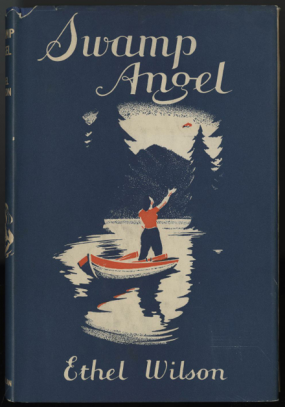Mrs. Wilson gauges in her fiction the many ways by which human contact is broken—through guilt, shyness, fear, jealousy, will to power, hate. The recurrent drama in her novels and stories is the withdrawal from familiar surroundings of the central character who sets out on a lonely quest of self-discovery.
—David Stouck (74)

First Edition of Ethel Wilson’s Swamp Angel. Copyright: public domain. McMaster University Libraries own the rights to the archival copy of the digital image in TIFF format.
Considered one of Wilson’s most accomplished works, Swamp Angel follows Maggie Vardoe (later Lloyd) as she flees her husband in Vancouver to help run a fishing lodge in the interior of British Columbia. The novel illustrates the tension between her personal autonomy as a woman, and the needs and perceptions of a largely heteronormative community. Through the transformations of the main character, we can observe a process of attaining personal agency and self-actualization in the midst of societal constraints. Maggie’s navigation of the personal, social, and cultural implications of her actions offers a feminist critique of women’s role in marriage at a time when divorce was condemned, and women had few options to work outside the home.
Other notable characters in the novel include her friend, Nell Severance, a former circus juggler, and her daughter Hilda. Nell’s act was to juggle pistols, and the “Swamp Angel” is the name of Nell’s favorite gun. It symbolizes how some use such objects to dominate or kill, while others can transform them into beauty and pleasure. Wilson explores the ways in which human beings make themselves and others happy or miserable, and sees compassion as a necessary but not always effective response to the suffering of others.
Questions to Keep in Mind While Reading
For help with critical reading, see Close Reading Prose.
- What is Maggie running from? What/who are the sources of her insecurity and fear, and also of her security and sustenance? What does her narrative reveal about her personality as she moves through and away from Vancouver?
- Consider how Wilson deploys humour in treatment of the abandoned husband. What might be the message conveyed by Maggie’s care to leave him a nice dinner before she abandons him?
- What is revealed through Maggie’s interactions with and knowledge of the environment that she moves through? What do descriptions of natural scenes reveal about her personality? What images, creatures, and activities are most important to revealing her desires for herself (i.e. which ones does she contemplate or pause over?)?
- What do Maggie’s relationships with other women reveal about her values and self-image? In what ways might the
Swamp Angel
—the gun with its varied owners—be considered a symbol of her values and desires?
Works Cited
- Stouck, David.
Ethel Wilson’s Novels.
Canadian Literature 74 (1977): 74–88. Print. (PDF) - Wilson, Ethel. Swamp Angel. Toronto: McClelland & Stewart, 1990. Print.








 ©
©